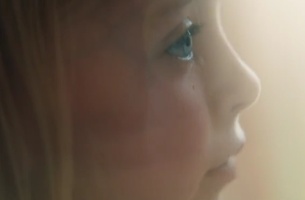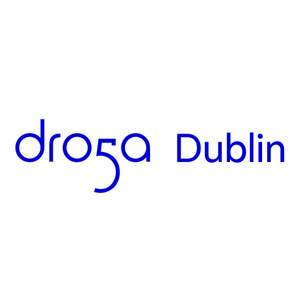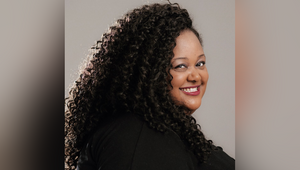
Your Shot: Tesco Christmas Campaign Gives Dozens the Chance to Share Personal Thank You Letters – on TV

Hosting Christmas Dinner is no small task. Between keeping your roasties crispy and your turkey moist, you’ve got to flit around with glasses of fizz and keep your hungry revellers entertained. But, as Dublin-based ad agency Rothco discovered, it’s also a pretty thankless task. On Christmas day we’re so wrapped up in our new prezzies and the excitement of seeing family that we rarely take the time to give our hosts a proper thank you.
That’s why Tesco Ireland are handing over their media space to the public to allow them to give share their appreciation with their hosts. TV, digital display, in-store announcements and even their home delivery vans.
The film component consists of 35 individual spots, each featuring one grateful guest reading out their thank you note. And the best bit is that all of the featured guests are members of the public – and their host won’t know about the gesture until they see it broadcast on television. In order to ensure the spots were authentic, Rothco partnered up with award-winning documentary maker Ken Wardrop and producer Andrew Freedman of Antidote Films. They sourced 600 genuine thank you letters and whittled them down to 35.
The result is a warm and emotive campaign rooted in truth – and one that also weaves the theme of thankfulness throughout all of Tesco Ireland’s Christmas communications.
LBB’s Laura Swinton caught up with copywriter Morgan Fiebig and art director Paddy Geraghty from Rothco as well as director Ken Wardrop to learn more about one of the first big Christmas campaigns of 2016.
The Thinking
LBB> What was the brief from Tesco for their Christmas campaign? What specifically did they want to achieve?
Morgan & Paddy> The brief was to win Christmas, which for us meant we needed to win the hearts and minds of Irish families.
LBB> At what point did you come across the idea of paying tribute to the people who host Christmas dinners?
Morgan & Paddy> It started last Christmas with research that Tesco conducted. The first major finding was that people were still apathetic toward the brand. The second was that there was one person in each household that spent on average €157 more than everyone else: the hosts. But we didn’t see the Christmas shop as simply a functional thing. Behind every Christmas shop is a big family event, a massive amount of planning, budgeting, time and care, thinking about every single person at every occasion. The host is actually channelling their wider family whenever they fill their trolley.
LBB> From a strategic point of view it makes sense to big up the hosts as they’re the ones getting the food in and making the big preparations – did that factor into the idea?
Morgan & Paddy> It started with the business insight that hosts spending on average €157 more than everyone else. This unlocked a powerful insight and really rich creative territory – that hosts are the true heroes of Christmas. When we delved deeper we were amazed to find out that they had never been properly celebrated or recognised or thanked before. This was really exciting for us, as we had landed on a territory that was so authentic for the brand, with real humanity and emotion at Christmas, but had never actually been done before.
LBB> And during the research phase, what sort of insights did you come across into what it means to host Christmas and the relationship between guest and host?
Morgan & Paddy> What came out in our research was that the gratitude that we were looking for wasn’t just missing in marketing, it was missing in our homes. Even though we are all aware of how much work goes into Christmas, most of us have never really given our hosts the thanks they deserve. So when we started reaching out to people to write thank you letters to their hosts, we were overwhelmed by their response. Giving people the opportunity to thank their hosts in such a significant way – that’s never been done before – was really meaningful for them.
LBB> What makes the campaign so clever, I think, is that there’s both a universal message (gratitude and love) as well as an intimacy and authenticity – each spot is a thank you letter to a real person. Why was it important that the films were rooted in these true relationships?
Morgan & Paddy> Christmas is such an intimate time, which is why it was so important that the ‘thank-you’ came directly from the host families themselves, rather than from Tesco. Protecting this authenticity was non-negotiable, which required rethinking our whole approach. It meant bringing in someone who knew much more about capturing real relationships than we ever could: the brilliant Ken Wardop. Ken was straight with us from the get go: if this was to be truly authentic, there was to be no one from client or agency on set. So that was that. It’s this ongoing trust (on behalf of Tesco and Rothco) that’s been crucial to making it all happen.
On top of that, using a mass medium for a personal one-to-one message was something that was particularly interesting to us too, knowing that the universal themes of gratitude and love would still resonate with everyone.
The Production
LBB> What was it about the idea from Rothco that really got your creative juices flowing?
Ken> I am a documentary filmmaker first and foremost, so I am always going to be excited when presented with an idea that depends on real people and their stories. I was also very intrigued by both the simplicity and the ambition of Rothco’s brief. Having people write thank you letters to their Christmas hosts struck me as a very heartfelt and genuine concept. In fact, it was something I should be doing myself. I knew if tackled correctly it could really resonate with Irish audiences. The scope of the project, with 35 separate films, would make this campaign a compelling adventure. It struck me as brave and bold. What director wouldn’t be excited?
LBB> Instead of a typical advertising approach, the letters were sourced by a specialist research team – what did they bring to the process?
Ken> The research team were the backbone of this operation – a highly motivated group of six people orientated and skilled individuals. They brought a great enthusiasm for the concept and truly believed it would deliver a very special campaign. Some of the researchers had previously worked on a feature project with myself and already knew the dedication that would be required. Others came from TV land with a wealth of experience casting large shows and were therefore not daunted by the scale of the task. Each researcher pitched the concept to a specific demographic. As a team we would liaise daily to hear about the developments, from the discoveries to the pitfalls.
LBB> You had 600 letters and whittled them down to 35 – what were you and the agency looking for?
Ken> In our ‘Letter’ brief we asked our perspective contributors to focus on a specific area of their host’s Christmas. Essentially we were trying to avoid vast quantities of letters that discussed Christmas in general terms. We believed by focusing in on one aspect of Christmas it would help us to connect with the audience better. For example, if a contributor wrote about their mum’s roasties we knew this would connect, as we all love our mum’s roasties and believe them to be the best. In addition to the more ordinary stories, we were drawn to the more unique stories that started to emerge. So when presented with a letter thanking a festive midwife for delivering a baby the previous Christmas it was hard to resist.
LBB> So I understand the shoots were set up in such a way that the agency and client were not on set, which is quite unusual for TV ads. Why was it important to work in this way?
Ken> This is a difficult question, as we obviously value and require both the input of the agency and client. However, when filming with ordinary people in their homes, a smaller team is always preferable. It helps to create a more intimate environment and is less intimidating and stressful for the participant. Ultimately, it’s important our subjects don’t feel like there is anything at stake or any need to perform. This campaign depended on genuine deliveries from our characters and we needed to do everything in our power to facilitate this. So instead of descending on mass into these worlds we created a system for the agency and client to review daily rushes from an online platform. We could then have a dialogue about each day’s material and were able to address any concerns moving forward.
LBB> From the film that I’ve seen – a little girl writing to her Nana – the reading feels so natural and not at all stilted. How did you work with the people to put them at ease?
Ken> There’s no real secret here. Firstly, I enjoy meeting new people. Secondly, being able to build up a quick rapport with people is an important part of my job. It’s simply all about getting people to be comfortable with me and to forget that there’s a camera pointing at them.
LBB> There were a LOT of films to make – how did you manage to keep every film fresh and interesting?
Ken> Actually we wanted all the films to feel stylistically and tonally similar. We want audiences to recognise them and to become familiar with their intimate approach. What keeps the films fresh and interesting is the array of characters that we feature and the very different stories and letters that they share with us.
LBB> During the shoot, were there any particular characters or moments that really stayed with you?
Ken> In fact, we’re still filming this campaign. I believe we have created 23 out of the 35 films. To-date our youngest letter writer is six years old and our eldest writer is a spritely 93 years of age. There have been many standout moments throughout this process. I suppose when you’re being welcomed into a new world on a daily basis there will always be a few unexpected surprises. The loveliest moment had to be when a lady shared that she was going to be a new mother. Something she and her husband were keeping secret so they could eventually share in one of our Thank You letters.
LBB> Did the experience make you rethink how you view Christmas and hosting Christmas dinner?
Ken> Well now… of course. In fact, I have offered to host Christmas myself this year. I’m sure this is something I will live to regret or perhaps, more worryingly, my guests will live to regret.
The Playout
LBB> Each ‘host’ won’t see the films until they are broadcast – are you planning any follow up with them?
Morgan & Paddy> The surprise element of these ads is really unusual and we are so looking forward to seeing how all the hosts react. The families that feature in the films will all be given their trans times and have been encouraged to capture their host’s reaction on video and share it on social. Again to preserve the authenticity, we wanted to let them record these themselves, so we’re really hoping a few of these will actually emerge on social so that everyone else can see the impact that the films are having on people.
LBB> Aside from the films, which are the centrepiece of the campaign, there are lots of other elements that feed into it, including digital interactive billboards, etc. I LOVE the idea of people using instore loudspeakers to thank their hosts – hijacking a piece of technology that the brand already possesses. How did that idea come up and what was Tesco’s response? Will you be capturing any of this?
Morgan & Paddy> Taking over their in store loudspeakers was actually inspired by a piece of copy that Tesco UK brought out for Father’s day, in which messages to dads were played through the speakers.
Another piece of ‘technology’ we’re hijacking that the brand already possesses is their home-delivery trucks. Knowing that the ads will likely inspire people to thank their own hosts – hopefully through writing their own letters – we want to make this as easy as possible for them. So this Christmas, if you take the time to write a thank you letter to your host, Tesco will deliver it for you, via its very own ‘Host Post’. Special letter-writing paper will be available in store (and go out to Tesco’s 750,000 Clubcard members) along with ‘Host Post’ boxes for people to drop their letters into, whilst one of their home-delivery trucks will be turned into a ‘Host Post’ van to surprise hosts throughout the season.
LBB> From a media perspective the whole campaign is interesting as it fundamentally gives the platforms over to customers so that they can share their messages of thanks – what do you think that says about the brand?
Morgan & Paddy> The most important thing to Tesco is that they make the host’s Christmas experience easier and more special than ever before, helping them in any way they can.
Handing over their whole campaign to the people of Ireland at the busiest time of year says a lot about Tesco and its direction moving forward – in particularly their bravery, their humanity and their commitment to Irish families.













